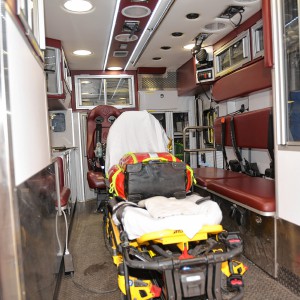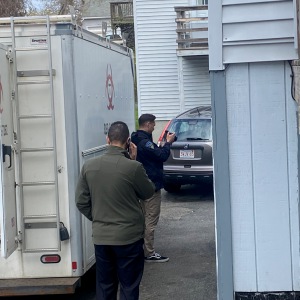Town officials, staff urge closer look at proposed $16.9M Pioneer budget
| Published: 02-10-2023 12:00 PM |
NORTHFIELD — Pioneer Valley Regional School District officials laid out their proposed fiscal year 2024 budget on Thursday, with town officials and school staff urging them to continue to “sharpen their pencils” ahead of next week’s vote.
Director of Finance and Operations Jordan Burns presented a nearly $16.91 million operating budget for the upcoming fiscal year, representing a 0.46% decrease from the current year. However, town assessments are expected to have an overall increase of 2.4% due to Warwick’s departure from the district come July 1. The overall impact — lost revenue subtracted by expenses saved — of Warwick’s divorce from the district is estimated at $479,021.
Much of Thursday’s discussion was led by town officials and district staff, who pressed administrators to continue to look at administrator pay and the salaries of teachers.
“Comparing some of the salary increases of some of the administrators — deservedly so, in some cases — in one year, some are going up 30%, 40% and one close to 50%, and the teachers get 2%? That’s hard to swallow for some of the towns,” said Bernardston Selectboard Chair Brian Keir, noting two Selectboard members in his town may vote against the budget based on the administrative line items.
Claire Brennan, president of the Pioneer Valley Regional Education Association (PVREA), questioned some of the increases in administrator pay. Line items she highlighted include: a 15.21% increase for the Bernardston Elementary School principal, a 18.34% increase for a Bernardston administrative assistant and a 48.79%, or $29,511, increase for Pioneer’s dean of students.
“If we already know that that’s high, why are we making it higher? … Those are some pretty difficult percentages to see,” she said. “More and more of the teachers have more of the responsibility, but the structure of your administration has grown. That, I think, needs to be looked at with a microscopic lens.”
Burns acknowledged these increases are “frustrating,” but to attract quality administrators to the district — which he said can help teachers make an even greater impact — the district needs to have competitive pay.
“Ultimately, a lot of hiring decisions are based on what people are paying at other schools because if you don’t offer a rate that’s even an average of what other schools are paying, that role won’t get filled. That’s a serious consideration,” he said. “You’re going to struggle to find volunteers to do the job. … If we don’t fill roles like dean of students or director of teaching and learning, even more will fall to the teachers.”
Article continues after...
Yesterday's Most Read Articles
 Police report details grisly crime scene in Greenfield
Police report details grisly crime scene in Greenfield
 On The Ridge with Joe Judd: What time should you turkey hunt?
On The Ridge with Joe Judd: What time should you turkey hunt?
 New buyer of Bernardston’s Windmill Motel looks to resell it, attorney says
New buyer of Bernardston’s Windmill Motel looks to resell it, attorney says
 Greenfield man arrested in New York on murder charge
Greenfield man arrested in New York on murder charge
 Man allegedly steals $100K worth of items from Northampton, South Deerfield businesses
Man allegedly steals $100K worth of items from Northampton, South Deerfield businesses
 Joannah Whitney of Greenfield wins 33rd annual Poet’s Seat Poetry Contest
Joannah Whitney of Greenfield wins 33rd annual Poet’s Seat Poetry Contest
Former School Committee Chair Julie Burke joined the conversation to say administrative salaries, in all industries, are targeted for cost-saving measures, but these are complex jobs, and while teachers should be paid more, that isn’t the reality.
“When I first joined the School Committee, I was astounded at the administrative salaries. I could not believe a superintendent made $140,000,” Burke said, before adding that her time on the School Committee showed her the countless roles administrators must take on. “Lamenting that is as simple as lamenting a town administrator makes $100,000.”
Renee Keir, who co-chaired contract negotiations for PVREA, emphasized the importance of administrators, but said rural school districts are bleeding teachers while administrative costs in school districts keep rising.
“I’m not arguing they shouldn’t make more — they work more,” Keir said. “But just the number of them, based on where we’ve been and where we are now.”
Superintendent Patricia Kinsella noted the teachers’ contract was negotiated and the budget presented Thursday could not change the terms of that contract without going back into negotiations.
School Committee member Stephen Martin said he was “grateful to hear teachers, being a former teacher myself, speak to the fact that they should have higher salaries,” but there is only so much the district can do.
He suggested “that money has to come from the towns.” Northfield Selectboard Chair Barbara “Bee” Jacque, however, said it’s not as simple as walking into Town Hall and requesting more funds. She noted each stakeholder — the administration, town officials, residents and teachers — has a role to play in the budget development process and part of her board’s role is to ask questions throughout.
“The role of the Selectboard and Finance Committee is ... to push back and ask questions,” Jacque said. “This is a bubble, and outside the bubble it’s even harder to explain to people why their tax rates go up. … It’s not that simple to go ask for more money because it affects people’s tax dollars.”
Prior to the discussion about administrator pay, Burns explained Warwick’s departure from the district will cut two of Northfield Elementary School’s classrooms, which is where that town’s students attend school. Warwick’s separation is expected to reduce Northfield’s enrollment by 32 students.
In the proposed plan, there will be one classroom for grades one, two, four and six, while there will be two third and fifth grade classes. The initial plan was to cut four classrooms from Northfield, but Burns said meetings with staff showed the need for smaller classes due to behavioral issues stemming from the pandemic. The school is expected to have approximately 15 students per class.
“As the NES faculty made clear, smaller class sizes are necessary,” he said. “Overall across the state, people might think these are enviable class sizes.”
Also part of the budget presentation was the return of woodshop classes at Pioneer. On the other hand, French classes will be phased out in the coming years. Burns said Pioneer isn’t trying to compete with Franklin County Technical School, but the addition of a hands-on learning experience might entice a student who is on the fence about staying at Pioneer.
“It seems to make deep impacts on students and the loss of woodshop seemed to make a deep negative impact on the community,” Burns said. “It’s not woodshop over French. … I do see the value of French, but at some point we have to make difficult decisions. … At the moment, it doesn’t seem like the interest is there.”
Jacque asked about recurring costs for woodshop classes, like machine repair and the ever-rising prices of building materials. Kinsella said the school will not be using or repairing any of its large machines in the coming year and the budget has allocated money for supplies.
The School Committee will vote on the presented budget on Wednesday, Feb. 15, at 7 p.m. in Pioneer’s library. Residents, town officials and all other stakeholders are invited to share additional feedback with the committee.
The district’s budget, slideshow and a recording of Thursday’s hearing can be found on the district’s budget development webpage at bit.ly/3luG6R1.
Chris Larabee can be reached at clarabee@recorder.com.

 What are the protocols for emergency transport of infants?
What are the protocols for emergency transport of infants? State records show Northfield EMS chief’s paramedic license suspended over failure to transport infant
State records show Northfield EMS chief’s paramedic license suspended over failure to transport infant Authorities ID victim in Greenfield slaying
Authorities ID victim in Greenfield slaying  Frontier Regional School students appeal to lower voting age
Frontier Regional School students appeal to lower voting age
